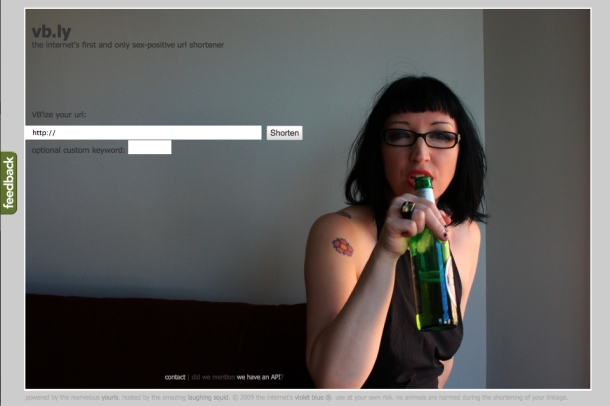Libyan authorities seize Vb.ly domain

A URL-shortening service with the domain suffix .ly has been taken offline without warning after the Libyan registrar deemed that it did not comply with that country's morality and laws.
The Vb.ly website had been in operation for a little over one year, but was taken down around 23 September after its domain was taken back by NIC.ly, the registry operator for Libya, due to "clear violation of NIC rules and regulations", according to a blog posted on Wednesday by site co-founder Ben Metcalfe. The .ly domain is the official extension for Libya.

A screenshot of the Vb.ly domain before it was taken offline. Screenshot: Violet Blue on Flickr
The government objected to "text referring to adult content and offensive imagery from [the] main page", Metcalfe said. The main page for Vb.ly showed an image of site co-owner Violet Blue with bare arms drinking from a bottle of beer, under the words: 'The internet's first and only sex-positive URL shortener'.
When the Vb.ly service launched, sex writer Violet Blue said it was encouraging people to use the service for creating links to adult sites and other 'NSFW' links. She noted that submitted links were not run through a filter, as they are on competing URLs shorteners. The service does not block any link, but does alert people to whether the link they submit is on a blacklist.
In a blog post, Blue quoted excerpts from a letter from Alaa ElSharif from NIC.ly, sent in response to the site owners' protests against the seizure of the URL.
"Pornography and adult material aren't allowed under Libyan Law, therefore we removed the domain, and before doing so we warned you through our resellers and gave you a relatively long grace period to rectify your situation," ElSharif is quoted as writing. "That you didn't receive/ignored our warnings is your problem not ours."
Both Blue and Metcalfe said they received no such warning from the reseller, Libyan Spider Network.
"The fact that NIC.ly is asserting editorial control over the content of any website using a .ly domain is perhaps the most troubling to any .ly
domain owner and indeed the internet community at large," Metcalfe
added, "Not only is it paramount to censorship and doesn't reflect the
decoupled nature of domains vs websites, but it sets a dangerous
[precedent] in the space."
He added that the Libyan registry's approach is especially concerning for anyone running a URL shortener or hosting user-generated content on a .ly domain.
However, ElSharif stressed that it was the "offensive" imagery and content that was at the root of the Libyan authority's move.
"Had your domain merely been a URL shortener for general uses similar to bit.ly (as you claim) there would have been no problem with it. It is when you promote your site being solely for adult uses, or even state that you are 'adult friendly' to promote it that we as a Libyan Registry have an issue," he wrote.
In June, Libyan authorities announced that new registrations for three letter or less .ly domains would no longer be allowed for individuals or companies that "do not have a presence in Libya". Existing owners of three letter or shorter .ly links can still renew them.
The ruling means that popular services such as Bit.ly, Ow.ly and Ad.ly would not have been allowed to register their respective URLs if the rules had been in effect from the outset.
Some services, such as TweetDeck, automatically use the Bit.ly URL shortener to allow users more flexibility within the 140-character limit imposed by the social-networking site.
Twitter also has its own link-shortening service which scans all shortened URLs against a blacklist of known malicious pages. The service is currently being tested on direct messages containing links, but the company hopes to roll it out to encompass all links "by the end of the summer", wrote Sean Garrett on the official Twitter blog on 8 June. Twitter's service uses the web address t.co, which is the top-level domain for the Republic of Colombia.